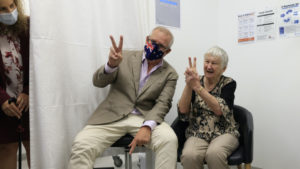These are the life sciences small caps almost unscathed by COVID-19

Pic: Charnchai / iStock / Getty Images Plus via Getty Images
Last week Somnomed (ASX:SOM) surprised by producing a not-as-bad-as-expected quarterly result, and today a raft of small caps are pulling similar rabbits out of top hats.
Life sciences small caps have either benefited from COVID-19 or not been hurt as badly as expected.
The factors behind the unexpected boost of life sciences small cap bottom lines include Genetic Signatures’ (ASX:GSS) and Cynata Therapeutics’ (ASX:CYP) COVID-19-oriented tests and products, pent up demand following lockdowns, and companies offered remote monitoring and diagnostic technologies.
Genetic Signatures saw strong demand for its lab-based COVID-19 detection kit, which was behind strong revenue growth.
Cash receipts for the quarter were $4.8m, more than double received in the prior three quarters and equal to this quarter’s cash burn. Cash in the bank stands at $31m.
In April, Genetic Signatures received regulatory registrations for the test in Australia and Europe, but it is still waiting on US approval.
Clinical trials back on the agenda
Pre-revenue stem cell biotech Cynata Therapeutics is benefiting from a recovery in clinical trial activity in Australia, with ethics approval for a phase-three osteoarthritis clinical trial in Sydney and for a clinical trial in COVID-19 patients admitted to intensive care.
The former trial is ready to start once recruitment is open again.
Cynata raised $8.3m in the quarter and has $13.7m in cash.
ImpediMed (ASX:IPD) had a very strong quarter for installations of its SOZO fluid retention measurement devices in US medical centres, and has benefited from pent up demand returning for non-COVID-19 procedures.
A total of 32 units were installed, with the majority completed late in the quarter as the COVID-19 shutdown restrictions eased. There were limited new device sales and reduced patient testing during the months of April and May.
Patient testing during the quarter was down due to reduced frequency of cancer patients visiting hospitals during COVID-19 shutdowns, but a record number of tests were conducted in June as cancer centres began bringing patients back in for treatment.
The company says it has strong recurring revenues. It received $1.4m in receipts and has $20m in the bank.
Telehealth beneficiary
PainChek (ASX:PCK) is benefiting from being a telehealth provider: it offers remote pain monitoring which is enabling it to continue rolling out licences to aged care facilities.
It has funding for 722 aged care facilities and 61,571 approved beds, just over half of which are funded by governments. This translates to $2.66m in normalised contracted annualised recurring revenue (ARR) in the second year of client contracts.
In December last year the Australian government signed an agreement to fund a $5m national trial of PainChek in residential aged care.
PainChek received $141,000 in cash receipts in the quarter, had a cash burn of $291,000, and had $6.1m in cash available.
Related Topics
UNLOCK INSIGHTS
Discover the untold stories of emerging ASX stocks.
Daily news and expert analysis, it's free to subscribe.
By proceeding, you confirm you understand that we handle personal information in accordance with our Privacy Policy.








